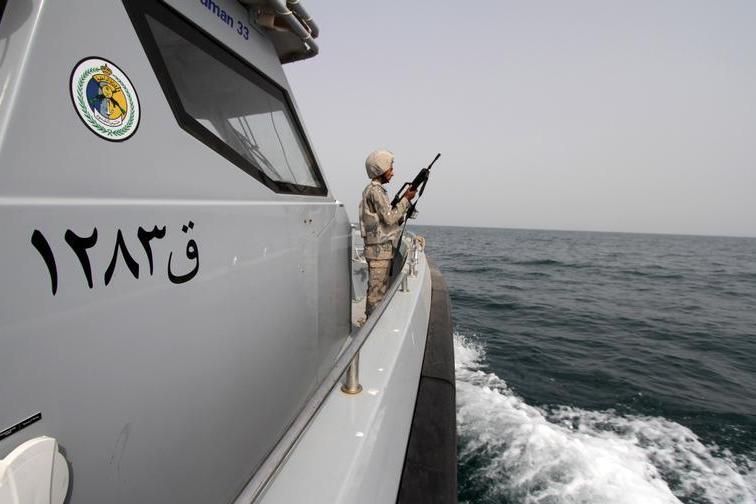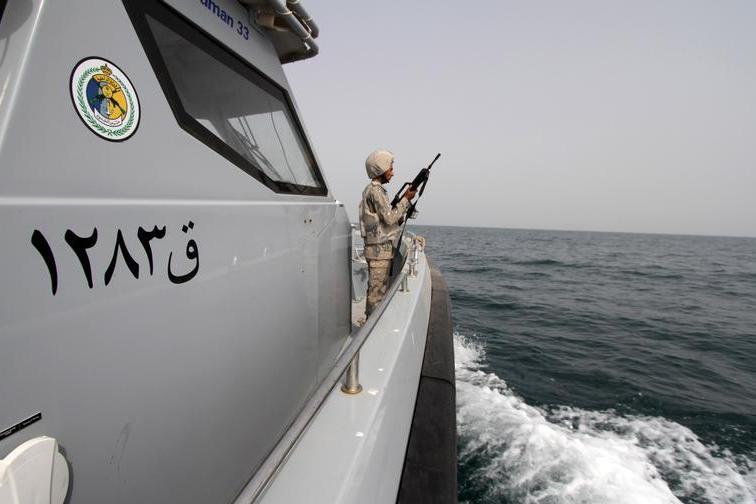Bahrain’s impressive navy officers, alongside their counterparts from Saudi Arabia, are being lined up to lead a maritime security task force which has been set up exclusively to safeguard regional waters.

The International Maritime Security Construct (IMSC), operating since 2019, has so far been commanded by seven commanders, all from the UK or US Navy.
The tide is turning towards a regional defence structure to deter maritime threats led by Gulf allies, according to IMSC’s present commander Royal Navy Commander Commodore Don Mackinnon.
IMSC comprises of nine countries including three GCC nations – the UAE, Saudi Arabia and Bahrain. It has been heavily staffed by British and American personnel, however the staff composition has gradually changed with more regional officers assuming leadership roles, said Cdr Mackinnon.
“Ultimately, our ambition for IMSC is that down the line, we will look to transition IMSC into something that is led by regional partners,” he told the GDN in an exclusive interview.
“In the future, my job could be done by an officer from Bahrain or Saudi Arabia – we’re not quite there yet, but we’re moving towards it. It’s a realistic aspiration.”
When IMSC as set up in November 2019 it was commanded by US Navy Rear Admiral Alvin Bull Holsey. Royal Navy Commander Commodore James Parkin took over IMSC in January 2020, followed by Royal Navy Commander Commodore Robert Bellfield who assumed office in April 2020.
He relinquished his office to UK’s Commodore Craig Wood in November that year and in March last year UK’s Commodore Adrian Fryer took charge. In July last year UK’s Commodore Gordon Ruddock took charge who relieved his office in November to Cdr Mackinnon.
“We have changed the composition of the staff overall – when we started in 2019 the IMSC was quite heavily US-UK focused with a small interaction from GCC partners,” added Cdr Mackinnon.
“Today, about a third of my staff members are from the GCC which is fantastic. We’re continuing to increase that number, not only in terms of headcount, but also in terms of levels of responsibility.
“So increasingly, we’re seeing more of our GCC partners stepping into more senior roles – soon I’ll have a new head of department joining from Saudi Arabia who will be my first head of department from a GCC partner.
“I’m also having a deputy head of department coming from Bahrain. Most of my departments would be run by UK / US officers and what we’ve been trying to do is move that across to meet more of our regional partners coming in.
“So not only do I have watch-standers, and analysts, I also have more senior people coming into leadership roles.”
The other member nations on IMSC are Albania, Estonia, Lithuania, UK, US and Romania which joined last month.
“At any given day, I would have anywhere between eight and 10 Bahrain officers and staff with me working with me,” added Cdr Mackinnon from Glasgow who was the first commanding officer of the Naval Support Facility when it was set up in 2017.
“I have a number of Bahrainis as watch standers, I have some intelligence analysts, and, of course, they (Bahrain Royal Navy) provide ships and assets at sea as well.
“In fact, without the contribution of Bahrain and all of our partners – we couldn’t do it,” added the veteran who served as the deputy commander of the UK Maritime Component Command (UKMCC) until 2018.
His earlier stints in Bahrain include that of his visits afloat with ships in 2003 and in 2007 to 2008 and ashore with CTF-150 in Bahrain in 2004 and 2006 as a staff officer.
IMSC, a response to an increase in threats to the freedom of navigation and free flow of trade in the international waters of the Middle East region, and its operational arm CTF Sentinel, focus on key waterways in the Arabian Gulf, Strait of Hormuz, the Bab Al Mandeb Strait, and the Gulf of Oman.
From November until last week 1,290 IMSC-flagged vessels successfully transited these waterways. CTF Sentinel has delivered 2,970 surface points of presence and 1,170 hours of airborne over watch from December.
Source: Zawya





